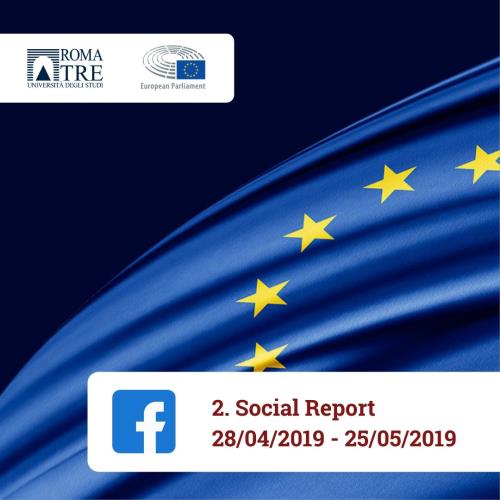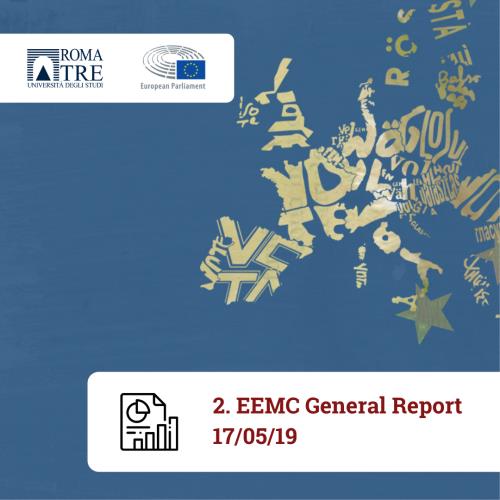Country report: CROATIA
28/04/19 - 20/05/19
The "Country report: CROATIA" has been based upon data gathered from 28/04/2019 to 20/05/2019.
Chart n°1 - Content typology
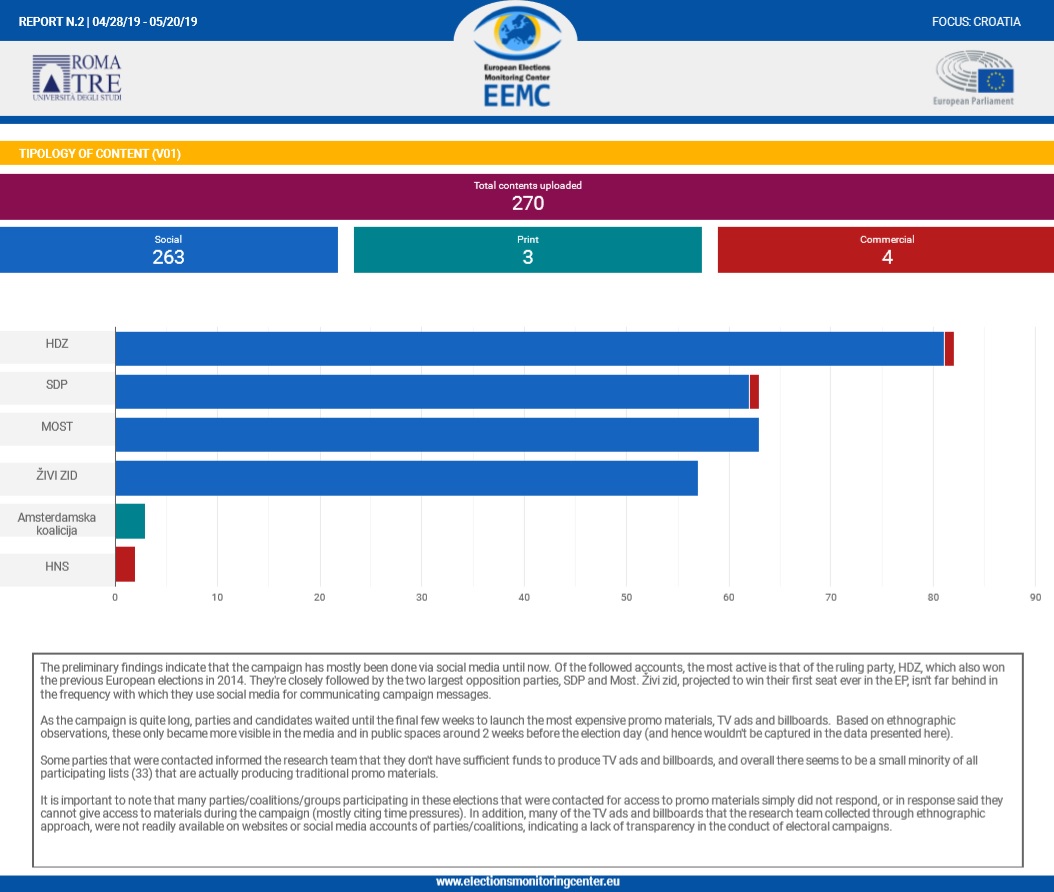
The preliminary findings indicate that the campaign has mostly been done via social media until now. Of the followed accounts, the most active is that of the ruling party, HDZ, which also won the previous European elections in 2014. They're closely followed by the two largest opposition parties, SDP and Most. Živi zid, projected to win their first seat ever in the EP, isn't far behind in the frequency with which they use social media for communicating campaign messages.
As the campaign is quite long, parties and candidates waited until the final few weeks to launch the most expensive promo materials, TV ads and billboards. Based on ethnographic observations, these only became more visible in the media and in public spaces around 2 weeks before the election day (and hence wouldn't be captured in the data presented here).
Some parties that were contacted informed the research team that they don't have sufficient funds to produce TV ads and billboards, and overall there seems to be a small minority of all participating lists (33) that are actually producing traditional promo materials.
It is important to note that many parties/coalitions/groups participating in these elections that were contacted for access to promo materials simply did not respond, or in response said they cannot give access to materials during the campaign (mostly citing time pressures). In addition, many of the TV ads and billboards that the research team collected through ethnographic approach, were not readily available on websites or social media accounts of parties/coalitions, indicating a lack of transparency in the conduct of electoral campaigns.
Chart n°2 - Focus
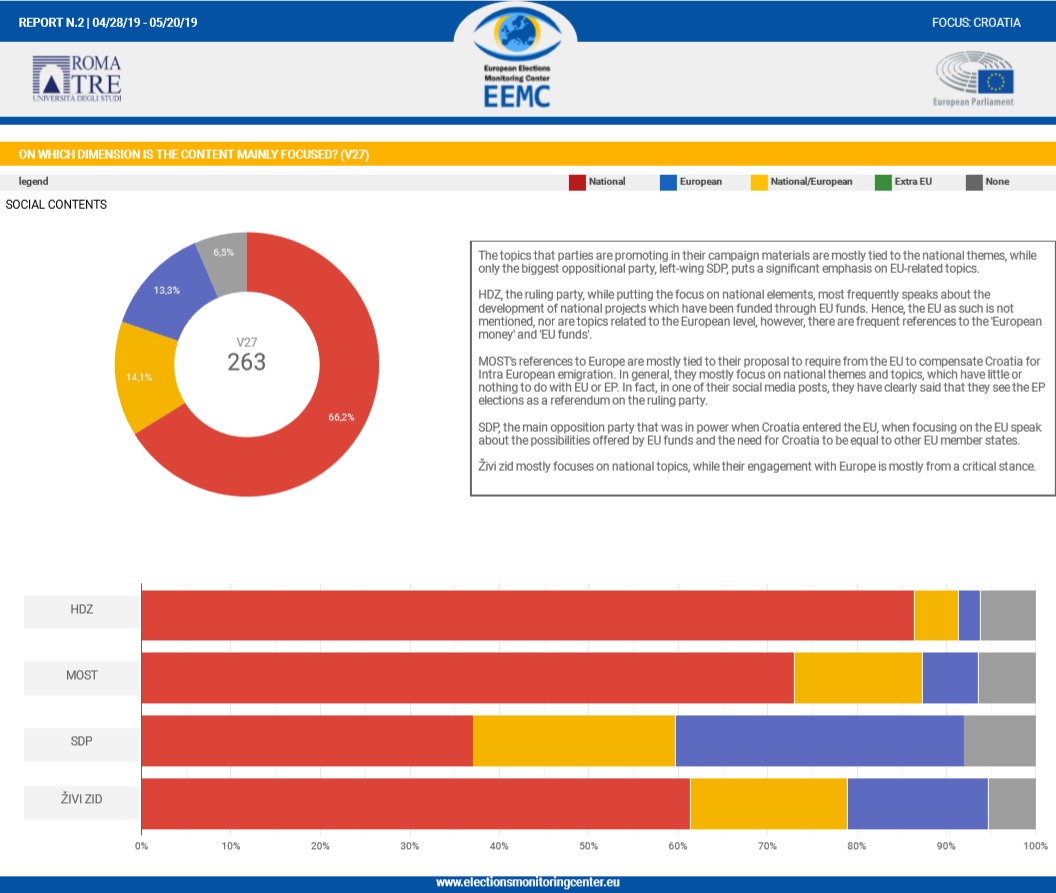
The topics that parties are promoting in their campaign materials are mostly tied to the national themes, while only the biggest oppositional party, left-wing SDP, puts a significant emphasis on EU-related topics.
HDZ, the ruling party, while putting the focus on national elements, most frequently speaks about the development of national projects which have been funded through EU funds. Hence, the EU as such is not mentioned, nor are topics related to the European level, however, there are frequent references to the 'European money' and 'EU funds'.
MOST's references to Europe are mostly tied to their proposal to require from the EU to compensate Croatia for Intra European emigration. In general, they mostly focus on national themes and topics, which have little or nothing to do with EU or EP. In fact, in one of their social media posts, they have clearly said that they see the EP elections as a referendum on the ruling party.
SDP, the main opposition party that was in power when Croatia entered the EU, when focusing on the EU speak about the possibilities offered by EU funds and the need for Croatia to be equal to other EU member states.
Živi zid mostly focuses on national topics, while their engagement with Europe is mostly from a critical stance.
Chart n°3 - How is Europe represented?
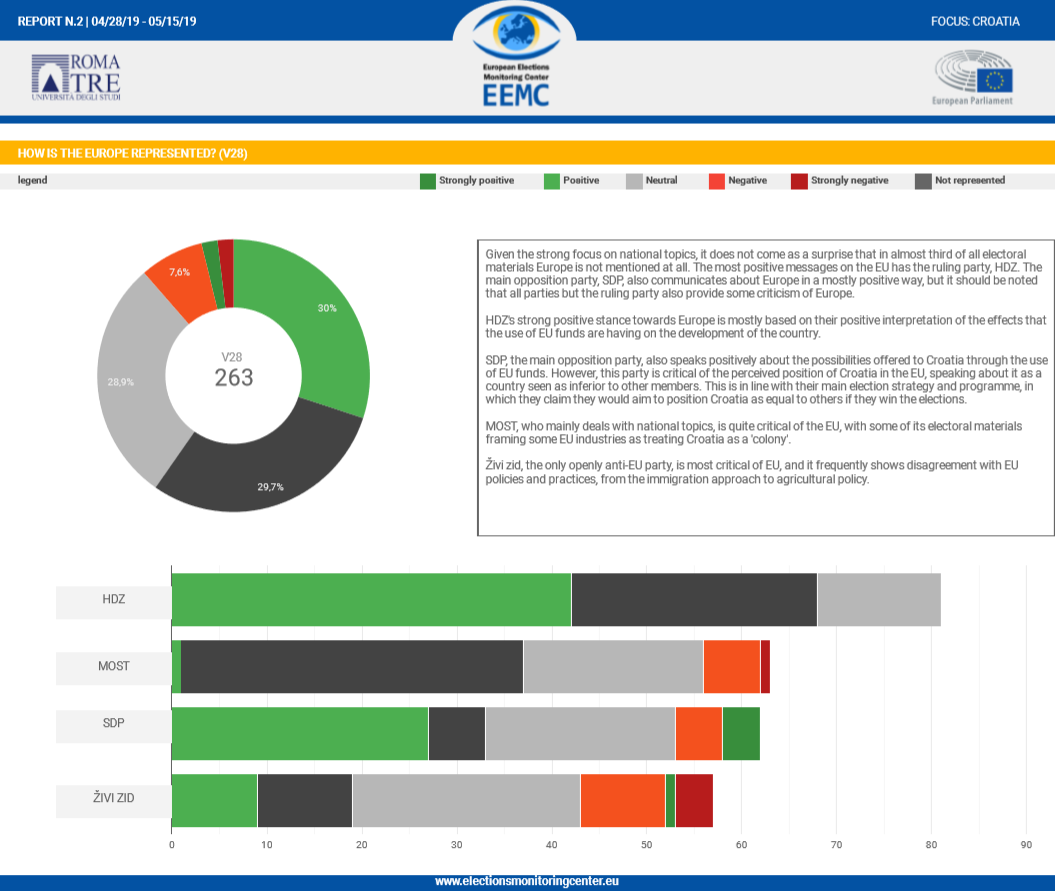
Given the strong focus on national topics, it does not come as a surprise that in almost third of all electoral materials Europe is not mentioned at all. The most positive messages on the EU has the ruling party, HDZ. The main opposition party, SDP, also communicates about Europe in a mostly positive way, but it should be noted that all parties but the ruling party also provide some criticism of Europe.
HDZ's strong positive stance towards Europe is mostly based on their positive interpretation of the effects that the use of EU funds are having on the development of the country.
SDP, the main opposition party, also speaks positively about the possibilities offered to Croatia through the use of EU funds. However, this party is critical of the perceived position of Croatia in the EU, speaking about it as a country seen as inferior to other members. This is in line with their main election strategy and programme, in which they claim they would aim to position Croatia as equal to others if they win the elections.
MOST, who mainly deals with national topics, is quite critical of the EU, with some of its electoral materials framing some EU industries as treating Croatia as a 'colony'.
Živi zid, the only openly anti-EU party, is most critical of EU, and it frequently shows disagreement with EU policies and practices, from the immigration approach to agricultural policy.
To download the "Country report: CROATIA" in pdf format:

The preliminary findings indicate that the campaign has mostly been done via social media until now. Of the followed accounts, the most active is that of the ruling party, HDZ, which also won the previous European elections in 2014. They're closely followed by the two largest opposition parties, SDP and Most. Živi zid, projected to win their first seat ever in the EP, isn't far behind in the frequency with which they use social media for communicating campaign messages.
As the campaign is quite long, parties and candidates waited until the final few weeks to launch the most expensive promo materials, TV ads and billboards. Based on ethnographic observations, these only became more visible in the media and in public spaces around 2 weeks before the election day (and hence wouldn't be captured in the data presented here).
Some parties that were contacted informed the research team that they don't have sufficient funds to produce TV ads and billboards, and overall there seems to be a small minority of all participating lists (33) that are actually producing traditional promo materials.
It is important to note that many parties/coalitions/groups participating in these elections that were contacted for access to promo materials simply did not respond, or in response said they cannot give access to materials during the campaign (mostly citing time pressures). In addition, many of the TV ads and billboards that the research team collected through ethnographic approach, were not readily available on websites or social media accounts of parties/coalitions, indicating a lack of transparency in the conduct of electoral campaigns.
Chart n°2 - Focus

The topics that parties are promoting in their campaign materials are mostly tied to the national themes, while only the biggest oppositional party, left-wing SDP, puts a significant emphasis on EU-related topics.
HDZ, the ruling party, while putting the focus on national elements, most frequently speaks about the development of national projects which have been funded through EU funds. Hence, the EU as such is not mentioned, nor are topics related to the European level, however, there are frequent references to the 'European money' and 'EU funds'.
MOST's references to Europe are mostly tied to their proposal to require from the EU to compensate Croatia for Intra European emigration. In general, they mostly focus on national themes and topics, which have little or nothing to do with EU or EP. In fact, in one of their social media posts, they have clearly said that they see the EP elections as a referendum on the ruling party.
SDP, the main opposition party that was in power when Croatia entered the EU, when focusing on the EU speak about the possibilities offered by EU funds and the need for Croatia to be equal to other EU member states.
Živi zid mostly focuses on national topics, while their engagement with Europe is mostly from a critical stance.
Chart n°3 - How is Europe represented?

Given the strong focus on national topics, it does not come as a surprise that in almost third of all electoral materials Europe is not mentioned at all. The most positive messages on the EU has the ruling party, HDZ. The main opposition party, SDP, also communicates about Europe in a mostly positive way, but it should be noted that all parties but the ruling party also provide some criticism of Europe.
HDZ's strong positive stance towards Europe is mostly based on their positive interpretation of the effects that the use of EU funds are having on the development of the country.
SDP, the main opposition party, also speaks positively about the possibilities offered to Croatia through the use of EU funds. However, this party is critical of the perceived position of Croatia in the EU, speaking about it as a country seen as inferior to other members. This is in line with their main election strategy and programme, in which they claim they would aim to position Croatia as equal to others if they win the elections.
MOST, who mainly deals with national topics, is quite critical of the EU, with some of its electoral materials framing some EU industries as treating Croatia as a 'colony'.
Živi zid, the only openly anti-EU party, is most critical of EU, and it frequently shows disagreement with EU policies and practices, from the immigration approach to agricultural policy.
To download the "Country report: CROATIA" in pdf format:
-
Related documents
-
Country Report, CROAZIA (28/04/19 - 20/05/19)

